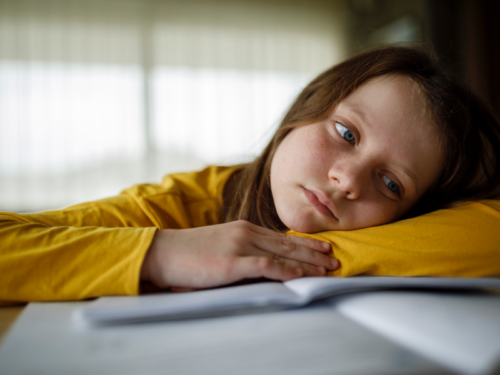
Table of Contents
Here’s How Alcohol Affects Depression

Written By: Ethan Cohen BSN, RN

Clinically Reviewed By: Dr. Don Gasparini
December 26, 2023
7 min.
Many people turn to alcohol as a way to cope with depression. Using alcohol as a coping mechanism for depression, however, may exacerbate depression symptoms.
Learn more about our Clinical Review Process
Table of Contents
Alcohol permeates countless parts of our lives, from toasting champagne at a celebration to ordering a glass of wine at dinner. Despite the social acceptability of drinking alcohol, there are various ways in which drinking can lead to mental and physical health problems. In this article, we’ll specifically focus on the bi-directional relationship between alcohol and depression. In short, drinking alcohol can have negative effects on depression, and depression can worsen drinking. Keep reading to gain a deeper understanding of the link between depression and alcohol use, especially in young people.

Personalized treatment from the comfort of home
We treat co-occurring depression and substance use disorders.
The link between alcohol and depression in young people
For some, part of the self-exploration of adolescence is figuring out how alcohol will fit into their lives. Some may wait to drink until they are of legal age or try alcohol once and swear it off afterward, whereas others may choose to drink recreationally. Statistically speaking, though, young people struggle to drink responsibly: The National Institute on Alcohol Abuse and Alcoholism reports that binge drinking comprises the vast majority (90%) of drinking done by young people.
At the same time, adolescence is increasingly a time of mental health struggles. According to a recent study, 15% of teenagers and nearly one-third of young adults are affected by depression. When considering the high rates of depression among young people paired with irresponsible drinking patterns, it’s easy to see how these variables could affect one another.
The research on the topic is conclusive; studies have found that people who drink often and unsafely (such as binge drinking) are more likely to develop depression than those who don’t. Similarly, people with depression, anxiety, and other mental health challenges are more likely to have co-occurring alcohol use problems. In short, drinking can negatively affect your ability to manage life and cause feelings of depression, or alcohol may be a negative coping mechanism for depression itself. Below, we dig further into this bi-directional relationship between alcohol and depression.

How alcohol use can lead to depression
Alcohol abuse can lead to the development of depressive symptoms in two primary ways: biologically and behaviorally.
Biological effects of alcohol use
While drinking alcohol may initially feel stimulating, alcohol is a depressant—a class of drugs that alter the activity and function of neurotransmitters in the central nervous system. For instance, in the short term, alcohol may slow speech and movement. Long-term, alcohol can lead to the continual dysregulation of the neurotransmitters in your brain that help manage mood, especially serotonin. The misfiring of these neurotransmitters due to drinking can be a major contributing factor in the development of depression.
Thus, while drinking alcohol causes short-term changes to our brain chemistry, excessive drinking can alter our brain chemistry long-term, leaving people vulnerable to depression. Reports highlight that people with a history of alcohol dependence (even those who had quit drinking completely) were four times more likely to experience major depressive disorder when compared to those without a problematic drinking history.
Behavioral effects of alcohol use
Research has shown that one night of binge drinking can impair a person’s ability to think clearly for up to thirty days. Consistently having your ability to think impaired due to excessive drinking can lead to behavioral changes that make it nearly impossible to maintain a well-balanced and active lifestyle—leaving people at risk of depression.
Specifically, the stress that can build up because of unhealthy drinking patterns can cause depression and anxiety to take hold. As mentioned before, this can create a vicious cycle in which the negative social consequences of drinking can cause problems with mental health, and in turn, mental health issues can lead you towards problems with drinking.
How depression can lead to alcohol abuse
Living with depressive symptoms can be incredibly challenging. Knowing how to cope with these negative feelings can often feel like an insurmountable task. Drinking alcohol can seem like an easy way to get out of your head and temporarily feel better. For a period of time, it may feel like drinking alcohol is helping to make life more manageable, but that rarely lasts very long. Here are some ways that depression can lead to alcohol abuse.
Alcohol as a negative coping mechanism for depression
As a pattern emerges in which alcohol use becomes the primary means of mediating stress and feelings of depression, the capacity for a person to engage their healthy coping mechanisms to manage their negative emotions declines. Drinking alcohol becomes the answer to every problem. Eventually, alcohol may seem like the only coping mechanism for depression. Coping skills take practice to be effective, so continually turning to alcohol as a form of self-medicating, especially early in life, can make it harder to find other coping skills for depression. Research shows that people who start drinking before the age of 15 are at a higher risk for developing alcohol use disorder later in life.
The genetic link between depression and alcohol use
Research suggests that specific genetic factors may create a predisposition for people to be vulnerable to both depression and alcohol use disorder. These shared genetic markers may influence neurotransmitter regulation, impacting mood and affecting the brain’s reward system in ways that contribute to the development of both conditions.
People who have a mental health diagnosis alongside the diagnosis of substance use or alcohol use disorder are often referred to as having a “dual diagnosis” or a “co-occurring diagnosis.” The combination of alcohol use disorder and mental health conditions (including depression) is incredibly common. According to reports by the Alcohol and Drug Foundation, half of people who suffer from mental illness also suffer from some form of substance use problem.

When to seek help for depression and alcohol use
Whether you’re struggling with feelings of depression, unhealthy alcohol use, or both, realizing you need help is the first step toward healing. Here are some questions to consider if you’re trying to decide whether to seek help for depression and alcohol use:
- Do you find yourself turning to alcohol in response to stress or negative emotions like depression and anxiety?
- Are there instances where you drink more than you initially intended?
- Do you often suffer negative consequences when you drink?
- Have you spent weeks feeling sad, worthless, or low energy?
- Have you spent weeks losing interest in activities you once enjoyed?
If you answered yes to any of these questions, you may want to seek professional help. Basically, if you feel like depression and alcohol use are affecting your ability to manage daily life, it’s a good idea to seek help—and help is available. A mental health professional can determine whether or not you’re struggling with clinical depression or alcohol use disorder and help you find the best recovery option for you.
Treatment for depression and alcohol use disorder
As mentioned, working with mental health professionals to address the interconnected challenges of depression and alcohol use is a crucial step toward recovery. Below are a few examples of treatment options available to people dealing with depression and alcohol use.
Psychotherapy
Psychotherapy, also known as counseling or talk therapy, is a cornerstone of mental health treatment. A mental health professional can help explore the root cause of your depression and alcohol use and help you develop strategies for recovery through psychotherapy. For people with a dual diagnosis of depression and alcohol use disorder, a subset of cognitive-behavioral therapy (CBT), known as behavioral activation therapy, can help address and modify dysfunctional thought patterns and behaviors that contribute to both diagnoses.
Medication
For some people struggling with depression and alcohol use, medication may be prescribed to manage depressive symptoms. Antidepressants can help regulate mood, and in the context of dual diagnosis, medications that target both depression and substance use issues may be considered. While most antidepressants can be prescribed in an outpatient setting, people who have a severe physical dependence on alcohol may require medically assisted detox, which includes medications and takes place in an inpatient setting.
Support groups
Participating in support groups, such as Alcoholics Anonymous (AA) or Dual Recovery Anonymous (DRA), can offer a sense of community and understanding. These groups provide a platform for people to share their experiences, gain insights into others’ healing journeys, and receive support from others facing similar challenges. Many of these support groups have no dues or fees for membership, making them accessible to anyone who wants to pursue recovery.
Inpatient treatment
As mentioned, depending on the severity of someone’s challenges with mental health and alcohol, outpatient treatment (like support groups, medication, and therapy) may not be enough. For these people, more intensive options, like inpatient or residential treatment, may be recommended.
Substance use disorder & co-occurring disorder treatment at Charlie Health
If alcohol abuse or substance abuse is impacting your mental health, Charlie Health is here to help. Charlie Health’s virtual Intensive Outpatient Program (IOP) provides more than once-weekly mental health treatment for young people dealing with complex mental health conditions, including those struggling with mental health conditions like depression and co-occurring alcohol abuse or substance abuse. Our expert clinicians incorporate evidence-based therapies into individual counseling, family therapy, and group sessions. With treatment, managing complex mental health conditions is possible. Fill out the form below or give us a call to start healing today.
References
https://arcr.niaaa.nih.gov/volume/40/1/alcohol-use-disorder-and-depressive-disorders
https://mhanational.org/alcohol-substance-abuse-and-depression
https://www.niaaa.nih.gov/publications/brochures-and-fact-sheets/understanding-alcohol-use-disorder
https://ajp.psychiatryonline.org/doi/10.1176/appi.ajp.20230004
https://www.buffalo.edu/cria/news_events/es/es18.html
https://www.ncbi.nlm.nih.gov/pmc/articles/PMC4864601/
https://www.apa.org/topics/substance-use-abuse-addiction/alcohol-disorders
https://onlinelibrary.wiley.com/doi/10.1111/j.1360-0443.2009.02577.x
https://www.psychologytoday.com/us/blog/in-practice/201303/why-stress-turns-depression



